Preparing and Planning
| Site: | NMC Learning Management System (Moodle) |
| Course: | Your NMC Journey |
| Book: | Preparing and Planning |
| Printed by: | Guest user |
| Date: | Wednesday, 15 October 2025, 11:16 PM |
Description
PPC
What happens on the first day?
Each instructor will have a different approach to the first day of class, but in most face-to-face classes you will:- Meet your instructor.
- Review the syllabus.
- Get a 'preview' of what the course is about or what you will be covering throughout the semester.
 Get
to campus early so you have plenty of time to park, find your building,
and find your classroom. It's important to arrive on time and be
prepared to stay for the whole class period. Many instructors will jump
right into the first lesson, guide you through your first activity,
and/or use the class time for students to get to know each other on the
first day.
Get
to campus early so you have plenty of time to park, find your building,
and find your classroom. It's important to arrive on time and be
prepared to stay for the whole class period. Many instructors will jump
right into the first lesson, guide you through your first activity,
and/or use the class time for students to get to know each other on the
first day.If you are taking an online class, log into eLearning (Moodle) on the first day of the semester (check your schedule, as it's not always a Monday). Your instructor will have some information ready for you about getting started in the class. Downloading the syllabus, writing an introductory post in a discussion forum, and completing a short quiz or survey are all common assignments at the very beginning of an online course. If you have any questions about accessing or navigating Moodle, call the Help Desk at 231-995-3020, or stop by the Student Success Center. If you have questions about how the course is organized or about your first assignments, e-mail your instructor as soon as possible.
What do I need?
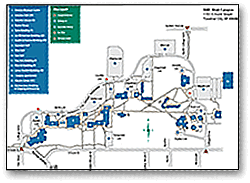 On your first day you'll want to have the following items with you:
On your first day you'll want to have the following items with you:- A printed copy of your schedule and campus map.
- A notebook or loose-leaf paper in a binder so you can take notes.
- A folder or binder so you can organize handouts and your course syllabi.
- Pens and pencils.
- A planner or calendar so you can keep track of upcoming assignments and important events.
- A flash drive or access to your NMC Q:/ drive so you can store digital files.
Many students also find it helpful to have the following supplies around for studying, though they may not bring them to class:
- Index cards.
- Highlighters.
- Pens of various colors.
- Binder dividers with tabs (if you are using a binder).
- Paper clips.
- Sticky notes.
- A stapler.
What are some tips for success?
Becoming a successful college student requires a special blend of knowledge, skills, and personal characteristics. Luckily, these are all things you can learn or develop as a student here at NMC. While certain programs of study will require slightly different mixtures of knowledge, skills, and characteristics, there are some that are universal.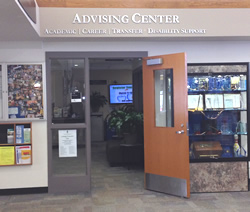
College isn't easy, but if you have a goal that you are excited about achieving, and are committed to putting in the hard work it takes, then you're well on your way to being a successful student!
Don't worry if your goal is still a little fuzzy, or you're feeling directionless; the NMC Advising center is here to help you find your way. Simply call 231-995-1360 to make an appointment with an advisor who can help.
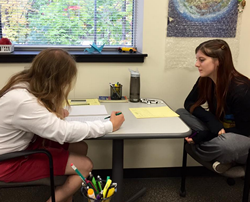 Seek help when you need it.
Seek help when you need it.NMC has tons of resources to help students be successful. Our most successful students are often the ones you see making a tutoring appointment, having their paper reviewed by a reader at the Writing and Reading Center, doing their math homework in the Math Center, or meeting with a Student Success Coach to improve their study methods. Use your NMC resource guide to find the resources you need as soon as things get tough.
Show up and engage.
Going to class regularly, being prepared for class, completing assignments, and participating in class is truly more than half the battle of being a successful student. So, if you want to be successful, attend your classes, pay attention, ask questions, participate, and complete your assignments.
Planning
Manage your time:
Time management is one of the most important aspects of succeeding as a student. You need to be able to set your own schedule and balance existing commitments.
Schedule your study time; book several time slots throughout the week. Stay committed to the times and treat them like an appointment that can't be missed.
Plan for at least ten hours of study time per week for each 3-credit course that you are taking.
Tools and Resources:
Make a plan
Don't wait until the last minute! Turn your course work in on time. Your instructor will provide what, when, and how activities and assignments are due. Use this information to plan your time. Tip: You know when you are the most productive; plan your studying during those times.
Having a set schedule for when you study, sleep, go to work, and go to school helps you plan when you can get things done. Keep track of your schedule by using a paper or electronic planner or calendar. Consider and include the following:
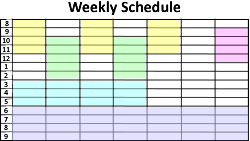 Classroom time.
Classroom time.- Time to park and walk to class.
- Homework time.
- Assignment due dates.
- Test dates.
- Projects - Schedule out each step (research, draft writing, due date, etc.)
- Commitments - school, clubs, sports, social.
- Family.
Organize and prioritize
Embrace Structure & Set Goals
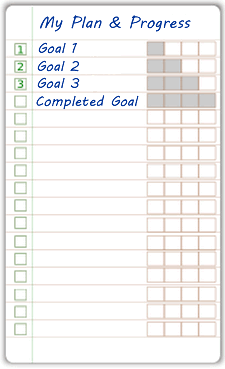 It's important to have a plan for achieving both long and short term
goals. Be sure to evaluate and re-evaluate the plan--it's okay for it to
change. Plan for obstacles. Be realistic.
It's important to have a plan for achieving both long and short term
goals. Be sure to evaluate and re-evaluate the plan--it's okay for it to
change. Plan for obstacles. Be realistic.
- Evaluate and re-evaluate the plan.
- Think about execution and obstacles.
- Be realistic.
- Celebrate successes (even small ones).
- Learn from failures.
- Don't give up!
Organize
During your planned course time, organize your activities to be most productive.
Course-related materials need to be organized for easy access. However, there is no set way to be organized. You'll need to determine what works best for you. For example, consider whether you prefer your work environment neat and clear, or if you work better surrounded by books and piles of paper.
Consider organizing your electronic files into course folders.
Prioritize
Use a "To Do” list. It will help with your organization skills and give you satisfaction as you cross-off completed activities.
Use the dates your instructor gives you to help prioritize your study time. Sometimes we set our priorities by doing activities we prefer or think are easier first, avoiding the less "attractive” items until later; don't spend time on a project due next week, when another assignment is due today.
